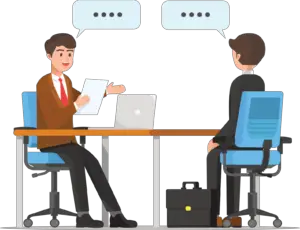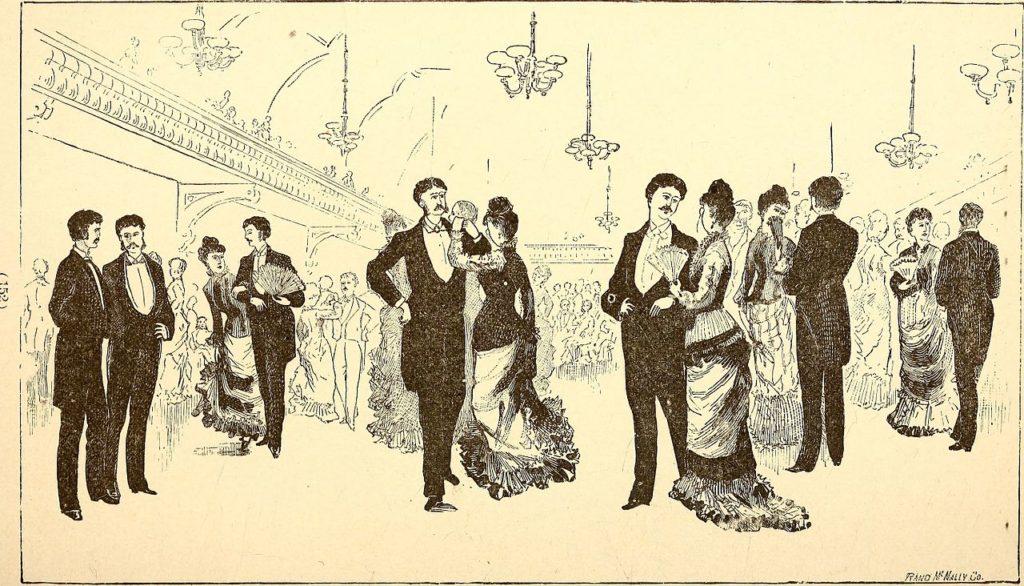Prepare for a business English job interview – introduction
As a non-native English speaker, being invited to participate in a business English job interview is a momentous occasion. It is an opportunity to demonstrate your abilities and make a positive impression on a potential employer. However, it is understandable to feel a sense of nervousness or anxiety about the interview process. Thus, it is crucial to adequately prepare and ensure that you do not blow this chance to showcase your expertise, skills, and professionalism.
In this article, I’ll discuss six steps you can take to get ready for a business English job interview. By adhering to these guidelines, you will feel more self-assured and ready to impress the interviewer with your knowledge and aptitude.
Research the company and the role
One of the most important things you can do to prepare for a business English job interview is to research the company and the role you are applying for. This will not only help you understand what the company does and what they are looking for in a candidate, but it will also show the interviewer that you are genuinely interested in the opportunity and have done your homework.
Start by visiting the company’s website and reading about their mission, values and products/services. This will give you a good understanding of the company’s culture and what they stand for. You should also research the job role and responsibilities in detail. This will help you understand what the day-to-day tasks and expectations of the job will be. you can also can use this information to tailor your answers to the interviewer’s questions.
It’s also a good idea to try to get a sense of the company’s work environment and culture. Look for articles or reviews online that mention the company’s culture, or try to connect with current or former employees on LinkedIn to get their perspective. This will help you get a better idea of what it would be like to work for this company and whether it’s the right fit for you. If you are fortunate enough to personally know someone who works at the company, make sure to ask them for an insider’s perspective – the good, the bad and the ugly!
If you do the company research correctly, you will also avoid potential embarrassment by asking about things that are clearly stated on their company website.
Practice common interview questions
Another important step in preparing for a business English job interview is to practice answering common interview questions. While you can’t predict exactly what the interviewer will ask, there are certain questions that tend to come up frequently in job interviews. By practicing these questions beforehand, you’ll be better able to anticipate what the interviewer might ask and feel more prepared and confident during the actual interview.
Here are some common interview questions that you might want to practice:
“Tell me about yourself.” This is often the first question that an interviewer will ask, and it’s a chance for you to give a brief overview of your background and qualifications.
“Why do you want to work for this company?” This is your opportunity to show the interviewer that you have done your research and are genuinely interested in the company and the role.
“What are your strengths and weaknesses?” Be honest and specific when answering this question. You can talk about a strength that is relevant to the job and a weakness that you are actively working on improving. A word of warning: if you answer that a weakness of yours is being just too much of a perfectionist, you will not impress the interviewer but will get points for cheesiness.
“How do you handle conflict or difficult situations?” This question is designed to gauge your problem-solving skills and ability to handle stress. Give an example of a time when you were able to successfully resolve a conflict or difficult situation.
“Where do you see yourself in 5/10 years?” This question is meant to get a sense of your long-term goals and career aspirations. Think about where you want to be in 5 or 10 years and how this job fits into your overall career plan.
By practicing these common interview questions, you’ll be able to provide better responses and feel more confident about the whole interview process.
Prepare your own questions to ask the interviewer
Asking thoughtful, well-prepared questions during a job interview not only shows the interviewer that you are engaged and interested, but it also gives you the opportunity to learn more about the company and the role. This can help you determine whether the job is a good fit for you and whether you would be happy working for this company.
When preparing your own questions to ask the interviewer, avoid asking about salary, vacation time and other perks. These topics are usually better suited for later in the hiring process, for example, in a second, follow-up interview. Instead, focus on asking questions that demonstrate your interest in the company and the role, such as:
- “Can you tell me more about the company’s culture and values?”
- “What are the biggest challenges that the team is currently facing and how are you addressing them?”
- “What do you think makes someone successful in this role?”
- “What new technologies have recently been implemented?”
- “Can you give me an example of a project that the team has worked on recently and how you approached it?”
Asking questions like these will not only show the interviewer that you are engaged and interested, but it will also give you a better understanding of what it would be like to work for this company and whether it’s the right fit for you.
Be yourself
Don’t try to pretend to be someone that you’re not. Or put another way, don’t try to force yourself to be what you think that they’re looking for.
This is important and bears repeating. The interview process is not just to see if they like you as a potential employee. It is also to see if you would like to work for them!
For example, if you realise that the company culture is the complete opposite of your own values and that, in order to work for the company, you would have to change everything about yourself in order to fit in, then this is obviously NOT the right job for you. Even if you got the job, you would not be happy working there.
Even though you don’t get the job, this is still a positive outcome for the interview. At the very least, you got some valuable interview practice.
Dress for success
When it comes to a business English job interview, it’s important to dress in a way that is professional and appropriate. Your appearance is often the first thing that an interviewer will notice and it can make a big impression on them.
When deciding what to wear to your interview, consider the company’s dress code and culture. If the company has a more formal dress code, men will want to wear a suit and tie – ladies will be wearing a professional equivalent, for example, a skirt/trouser suit or a blouse/blazer combination. If the company has a more casual dress code, you can still dress professionally, but you may have more flexibility in what you wear. In general, it’s a good idea to avoid wearing jeans, t-shirts, or overly casual clothes to a job interview.
It’s also a good idea to pay attention to the little details. Make sure your clothes are clean, ironed, and in good condition. Avoid wearing strong fragrances or a lot of jewellery. And make sure your shoes are polished and in good condition.
By dressing in a way that is professional and appropriate, you’ll show the interviewer that you are serious about the opportunity and respect their company.
Depending on the role, you might have to make customer visits and dressing appropriately shows the interviewer that you can be trusted not to embarrass the company.
Practice your English skills
If you’re a non-native English speaker, it’s important to take the time to practice your English skills before a business English job interview. While you may be proficient in English, the interview setting can be nerve-wracking, and it’s natural to feel a little more self-conscious about your language skills.
One way to practice your English skills is to review common business English phrases and vocabulary. Make a list of the words and phrases that you find difficult and practice using them in the correct context. You can also try speaking with a native English speaker or joining an English conversation group to get more practice. You might like to check out a wide range of online options.
It’s also important to pay attention to your tone, pace and volume when speaking in English. Try to speak clearly and at a moderate pace. Be mindful of your volume so that you can be heard and understood. It is common to speak quicker when you’re nervous, so be aware of this and make an effort to breathe properly and, if necessary, slow your speech down by 5% or so.
Take the time to practice your English skills. You’ll feel more confident and prepared for your business English job interview.
Prepare for a business English job interview – summary
Preparing for a business English job interview takes time and effort, but it’s well worth it. By following the tips outlined in this article, you will feel more confident and ready to make a great impression with the interviewer.
Some key things to remember when preparing for a business English job interview include
- researching the company and the role
- practicing common interview questions
- preparing your own questions to ask the interviewer
- being yourself
- dressing for success
- practicing your English skills
Don’t underestimate the importance of preparation. Taking the time to properly prepare for a job interview will pay off in the long run, and it will give you a better chance of getting the job you want. So don’t be afraid to put in the effort, and best of luck in your job search!



